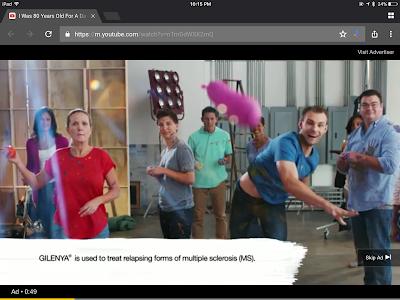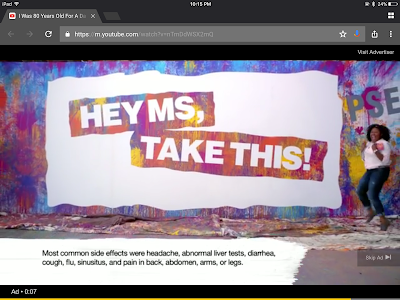Multiple
Sclerosis: a disease in which the immune system eats away at the protective
covering of nerves
I was watching a Buzzfeed video (yes,
I know I should not become addicted to these videos) and there was an ad
playing about multiple sclerosis. I normally just try to skip the ad as fast
as possible because I want to watch the video. However, after further thought, this
action—adopted by almost everyone—is a signal of our rejection of viewing
chronic illnesses. We are not interested in learning about a disease that many people
around the world suffer. Yet, the commercials are also at fault. If you look
below, the images show happy, active people who look perfectly “normal.” It is
as if this magical medication was able to cure their illness and keep their
nervous system intact. Not to mention, the last photo states, “real people,
real stories.” If the ad is truly a demonstration of people who suffer from
multiple sclerosis, why do none of people have a slight motor disability? Sure,
a drug can slow down the progression of the disease and alleviate a few
symptoms, but the people would still have some issues—including the side
effects the lady on the picture seems happy about.
People who are initially diagnosed with
this degenerative disease are told the same facts: there are no cures, there
are only treatments to help alleviate symptoms, you will end up in a
wheelchair, and you will live until your imminent death. Not only do these
people come to the salient realization that their future will not be what they
imagined, but they also have to deal with the physical and emotional abuse
society throws towards them. Scathing remarks—cripple—are precariously used to
describe people with disabilities, causing a feeling of inadequacy; they compare
themselves and see only the ideal body types being displayed. While “normal”
people may have surgery done to enhance their appearances, disabled people
cannot escape it. They cannot hide from society and mask who they are: they are
thrown into a society that neglects the need for accessible facilities. Take
Troy High School for example. The hallways are far too crowded to give students
on wheelchairs space to maneuver; the defunct elevator moves at a snail’s pace,
almost suggesting that getting to the students’ destination in a timely manner
is not important; the classrooms have tables that are too high to reach.
Furthermore, this daily struggle is
not simply faced during their childhood—it is a continuous cycle that they must
face. I recently watched What Would You
Do? and how deaf discrimination pays a roll in job employment. The show set
up a scenario where a manager openly said that he would not accept the deaf
girl’s application. As with most episodes, there are always many Samaritans who
object the injustice presented. However, only one man brought himself to go
against the manager’s judgement, stating that rejecting an application based on
a disability is outright discriminatory. Not to mention, there were several
human resource workers who not only supported the manager’s decision, but also
gave him advice on how to handle the situation better: accept the application
but write a note reminding yourself that the applicant is “unfit.”
Our society is not just unaccustomed to seeing disabled people, but it believes that these people are not inherently equal to everyone else. As Mairs states, “for the disable person, these include self-degradation and a subtle kind of self-alienation not unlike that experience by other minorities” (14). Although many people with disabilities are able to come to terms with their body, many still struggle with internal hatred: the belief that they are not as valuable and are the rejects of society.




This was an amazing post Richard! It was great to see how you pointed out the stereotypes of MS in the ad. It was also nice how you used an example from What Would You Do? to reveal discrimination against the disabled. You even made an effective allusion with the word "Samaritans."
ReplyDeleteWow Richard. Great post. This was extremely heartfelt and personal. I really appreciate your honesty. I enjoyed the use of the buzzfeed video.
ReplyDeleteNice blog. Your elevated diction is used so effortlessly and really adds to the sophistication and overall quality of your writing. Introducing your own personal experience was very brave and I love how you included your overcoming at the end.
ReplyDelete